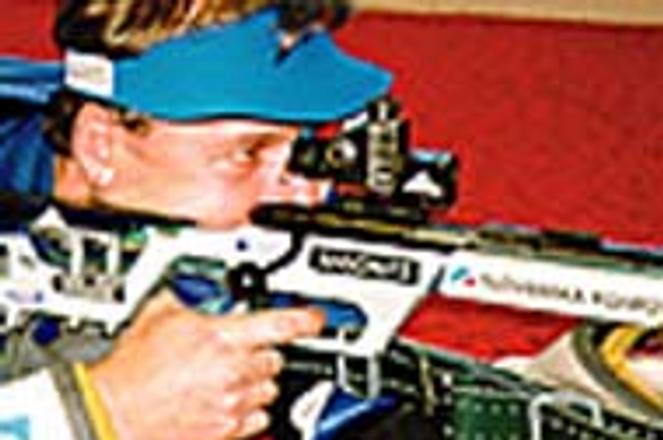After winning the bronze in Atlanta in 1996, sharp-shooter Jozef Gönci is taking aim at the Gold in Sydney.photo: TASR
Why did Slovak rifleman Jozef Gönci win the bronze medal at the 1996 Atlanta Summer Olympics? And why is he now considered the best marksman in the world?
According to Gönci and his coach, the answer is simple: God.
It seems that God takes control of gun-shooting events and rewards Gönci for his unshakeable faith. "Gönci's terrific shooting results are influenced by his trust in God," said Anton Beľák, Gönci's coach of seven years and the 1980 Czechoslovak air-rifle champion (40 shots). "These shooting results should show people that the path we follow is the right one. Gönci's victories offer material evidence of God's existence."
While some may take umbrage at the idea of God rooting for a side in a sporting event, no one can deny Gönci's prowess. The country's national rifle shooting finals recently concluded and, to nobody's surprise, Gönci notched yet another victory.
Gönci (26) will compete in three separate disciplines at the 2000 Sydney Olympics: air-gun at 50 metres, small bore rifle from a prone position (60 shots), and small bore rifle from a prone position, crouching and standing (40 shots each). Slovak Ján Fabo (37), who also went to the Atlanta Games, will compete in hand gun prone (60 shots) and air-gun (60 shots). Rounding out the team is Andrea Stranovská, who will compete in the skeet shooting competition.
Gönci is expected to return from Sydney with another medal. "Everybody would love to see him on the highest podium with the gold," said Aneta Domanovská, a Slovak Shooting Union referee. "Since all three of Slovakia's Olympic [shooting] sportspeople are very well prepared, Fabo and Stranovká are also expected to take home medals."
Since Gönci's bronze in 1996, he has been on a tear, winning every contest he's entered. In 1998 and 1999, he won the overall title in the World Cup, gold in the World Championships, and was twice elected Shooter of the Year by the members of the International Association of Sport Shooting Journalists.
But even with such credentials, Beľák said, the shooter will have to improve on his 1996 results if he hoped to win the gold. "The level of the world's best shooters has improved rapidly during the last four years," he said. "While [Gönci's score of] 1,166 points in his favourtite discipline - 3x40 shots - were sufficient in Atlanta, winning the Sydney Olympics will demand a final score of three or four points higher."
Gönci shares the world record for points in a single competition with 1186 points. "It is very unlikely that in the near future somebody else could approach that score," Beľák said. "Even at the European Championships, Gönci was ten points ahead of other shooters."
In order for Gönci to carry the day, his coach said, he would have to put forth the maximum level of concentration and overcome the extremely tough competition. Besides God, he said, other factors influencing the outcome include weather changes and the consequent shooting conditions. Since Sydney's summer is just now beginning, Gönci and his coach will travel to Australia two weeks before the events in order to adapt to the local conditions.
"Shooters have to become perfectly familiar with the new conditions, to figure out when the best time is to shoot," Beľák continued, adding that shooting is a psychologically demanding sport requiring the sportsman to consider all conditions properly. "Any unexpected change can easily create discomfort, and then his results would not reflect his capabilities."
For Stranovská, who won bronze in the 1998 Barcelona World Championships, qualifying for the Games made up for disappointing outcomes before the last two Olympics which left her off the team. "Finally my dream has come true, and I will go to the Olympics," she said emphatically. "I lost the chance to participate at the Olympics twice because I missed one target each time. But making the team now is a big success in my life and I see it as a reward for the 16 years I've spent shooting."
Stranovská's career began when she was just 14, and since then she says that she has experienced the many challenges women face competing in this predominantly male sport. But, she adds, the skeet shooting competition is becoming more popular among women, prompting her to warn: "Men... start shaking in your boots!"

